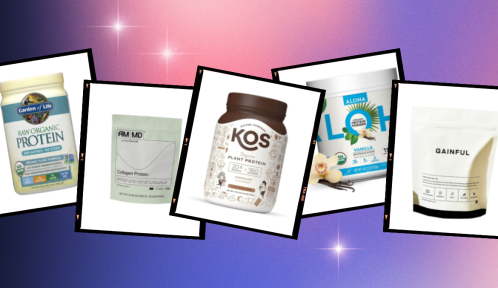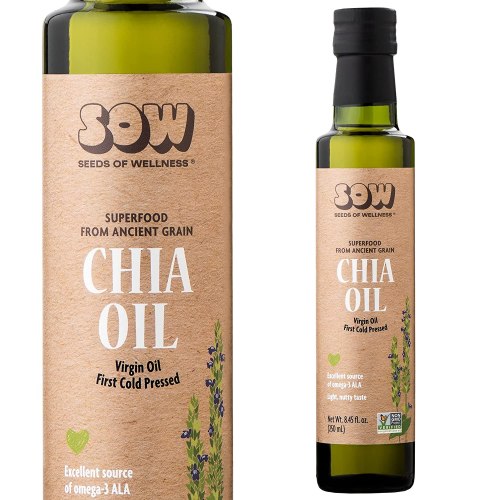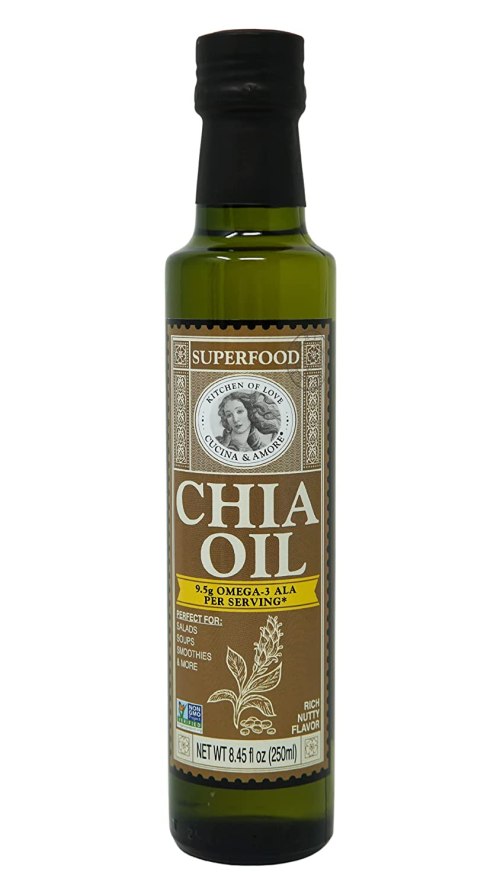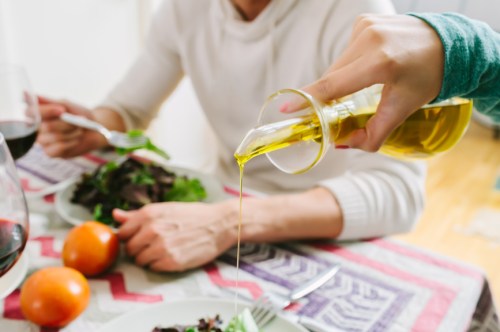Our editors independently select these products. Making a purchase through our links may earn Well+Good a commission
Here’s a juicy fact: According to Wendy Bazilian, DrPH, MA, RDN, a doctor of public health and nutritionist and owner of Bazilian’s Health in San Diego, much as we love olive oil and avocado oil for their longevity-boosting benefits, chia oil might be an even better option when it comes to anti-inflammatory oils—or at least one well-worth adding to your repertoire of favorite cooking oils. There’s plenty of science to back Bazilian up, too: The benefits of consuming chia oil are well-researched, and it’s indeed packed with heart-healthy and anti-inflammatory properties, to name a few.
Experts in This Article
We caught up with Dr. Bazilian, who shared more about chia oil’s longevity-boosting nutrients, how to cook with it, and how it stacks up against other popular cooking oils on the market. The next time you’re shopping for groceries, we promise you’ll know exactly which type of chia oil to slide into your weekly meal prep routine.
The longevity-boosting benefits of chia oil
According to Dr. Bazilian, cold-pressed, unrefined chia oil—which has been used in many ancient civilizations for over 3,000 years—is an excellent source of the essential omega-3 fat ALA (alpha-linolenic acid), which is good for both your head and heart because it supports brain and cardiovascular functioning. “In fact, chia seeds contain the highest level of this omega-3 fat found in nature,” Dr. Bazilian says. And a little goes a long way: “A single teaspoon of chia oil is considered an ‘excellent source’ of this essential omega-3 and provides more than the daily adequate intake level established.”
“A single teaspoon of chia oil is considered an ‘excellent source’ of this essential omega-3 and provides more than the daily adequate intake level established.” —Wendy Bazilian, DrPH, MA, RDN
For context, Dr. Bazilian says that avocado oil and extra virgin olive oil have less than one percent ALA, and canola oil has less than nine percent of the omega-3 fatty acid. “Most cooking oils have higher percentages of monounsaturated fats and/or omega-6 polyunsaturated fats. Balancing out the types of unsaturated fats in your diet by adding omega-3s can be beneficial for health,” she says.
Dr. Bazilian also notes that this type of healthy fat not only imparts a delicious flavor to what you’re cooking, but it also provides a source of energy that helps make our cell membranes flexible and increase the absorption of other nutrients like fat-soluble vitamins A, E, D, and K.
To further reap the benefits of chia oil, Dr. Bazilian recommends pairing it with other nutrient-rich ingredients. “Fats, in general, can help with the absorption of certain phytonutrients, like carotenoids, which are found in carrots, leafy greens, avocados, and other vegetables. So when you eat chia oil with foods like spinach, carrots, or kale, your body will have an easier time absorbing the rich vitamin K and vitamin A—and your bones, skin, and immune system all benefit,” Dr. Bazilian says.
Growing evidence has also linked chia oil to anti-inflammatory properties related to staving off certain metabolic conditions like heart disease, dyslipidemia, and high blood pressure, to name a few. What’s more, chia is vegan-friendly, gluten-free, has no known allergenicity, and is high in protein and fiber. Generally speaking, chia oil is safe for most folks to consume regularly. However, those who take blood thinners or those with gallbladder-related illnesses should consult their physician before consuming.
How a registered dietitian recommends cooking with chia oil
Since chia oil has one of the highest smoke points of all plant-based cooking oils, it’s highly versatile and lends itself well to cooking in various ways. “Chia oil’s smoke point is 420°F, as verified by stability tests at various heat treatments,” Dr. Bazilian says. (For context, extra-virgin olive oil has a smoke point of 400°F, and avocado oil is 480°F.) Thus, chia oil is equally great for cooking at high heat as it is for serving at room temperature or cold, which offers high levels of important phytonutrients like phenolic acids, tocopherols, and phytosterols.
The 12 Best—and Healthiest—Protein Powders, According to Registered Dietitians

Want To Transform Your Outdoor Space into a Calming, Boho-Chic Escape (Um, Yes)? Start with These Steals

I Tried Amazon’s Best-Selling Vibrator That Shoppers Say ‘Brought Them to Intense Climax Every Time’—And Here’s What Happened

Dr. Bazilian recommends using chia oil to drizzle on top of dishes, using it to make dressings or marinades, or for sauteing or stir-frying ingredients. Additionally, thanks to its mild, delicate, and mostly neutral flavor, chia oil’s ideal for baking or even adding to smoothies—which she says can elevate a recipe’s silky, smooth mouthfeel. Plus, Dr. Bazilian recommends mixing and matching chia oil with other healthy cooking oils—like olive and avocado—to boost the nutrients in a recipe even more. “Often, I’ll use olive or avocado oil combined with chia oil,” she says.
The best chia oil options on the market
“Quality chia oil starts with a seed that is pure and high nutrition from the planting, growing, harvest, and processing, made with no chemicals solvents, enzymes or diluents,” Dr. Bazilian says. Chia oil made from high-quality seeds will have the highest amount of antioxidants and nutritional value. “Look out for key indicators, such as cold-pressed and unrefined, or if the label mentions that it’s grown through regenerative agriculture.” This includes brands like SOW’s unrefined, extra-virgin chia oil or Cucina & Amore’s chia oil, both available on Amazon.
To keep your chia oil as fresh as possible, Dr. Bazilian recommends storing it in a cool or room-temperature environment in an airtight dark bottle or container away from direct sunlight. If kept within these conditions, it can last upwards of six months. However, if it becomes rancid or has a foul odor, it might be time to bid adieu to your expired bottle of chia oil.

SOW’s Unrefined, Extra-Virgin Chia Oil — $12.00

Cucina & Amore’s Chia Oil — $12.00
An RD shares the benefits of olive oil:
Sign up for the Well+Good SHOP Newsletter
Get exclusive deals on wellness, beauty, fitness, and food products that have been hand-picked by our editors.
Got it, you've been added to our email list.








